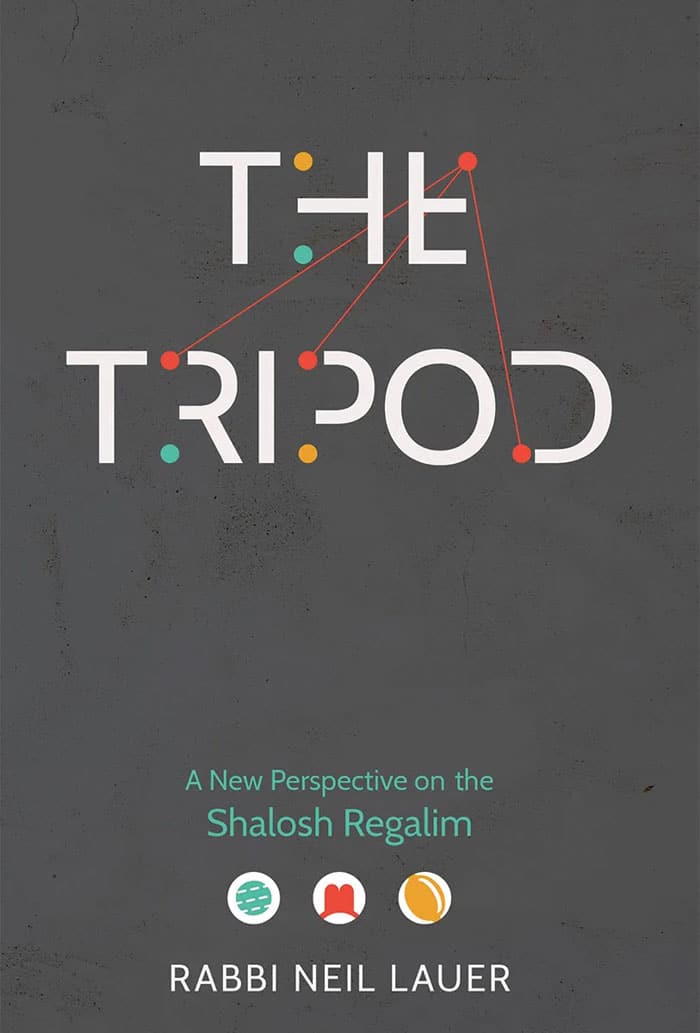
The first thing that strikes you when you open “Tripod: A New Perspective on the Shalosh Regalim,” by Rabbi Neil Lauer, is that the author wants to pull us out of the weeds of Judaism.
What are those weeds? They are the hustle and bustle that we see when we just look straight ahead and miss the big picture around us.
He uses the analogy of a central bus station, when most travelers will focus on making sure they don’t miss their bus, while missing the grandeur of the station itself. Lauer’s book is a call for us not to miss the grandeur of Judaism that surrounds the “grand station” of our tradition.
He contrasts, for example, the narrow approach of observing festivals — focusing on “praying, eating and spending time with family”—with a “broader and more nuanced appreciation of the agendas and significance of each holiday” when one reflects on “the festival’s impact on all aspects of their life.”
 At first, this seems a little too obvious: Why would anyone not want to make the most out of each holiday to positively impact their lives? It’s only when we return the bus station analogy that it becomes less obvious. The reality is that most of us lead our lives — religious or otherwise — by going from one bus to another. It’s human nature: we do what needs to be done in the moment, day after day.
At first, this seems a little too obvious: Why would anyone not want to make the most out of each holiday to positively impact their lives? It’s only when we return the bus station analogy that it becomes less obvious. The reality is that most of us lead our lives — religious or otherwise — by going from one bus to another. It’s human nature: we do what needs to be done in the moment, day after day.
When a Jewish holiday arrives, we give it the same pragmatic approach. We get busy with food shopping, preparations, prayer services, invitations, etc., because there’s so much to be done. Who’s got time to savor the holiday’s broad impact on all aspects of our lives?
That is why Lauer’s call is far from obvious. It goes against human nature.
The timing of the book is fortuitous, as the isolation many of us felt from the pandemic has prepared us for contemplating a broader view of life. Indeed, this book demands from us contemplation.
The timing of the book is fortuitous, as the isolation many of us felt from the pandemic has prepared us for contemplating a broader view of life.
Indeed, this book demands from us contemplation.
Lauer does a deep dive on each festival, inviting us to look at each holiday from every possible angle, from historical to legal to biblical to agricultural to ritualistic, among others, while making unusual connections between the holidays.
The title of the book, “Tripod,” sets up the idea that the sum of the three festivals is greater than their parts. We’re asked to contemplate not just how each holiday impacts our lives but the sublime wholeness of the three festivals.
The three holidays, Lauer writes, “form a unit of the basic theological lessons of Judaism.”
This “tripod” unit poses an obvious challenge to Jews who pick and choose what they observe. Among many in the non-Orthodox world, for example, Shavuot and Sukkot are often overlooked; many will only observe the annual Seder at Passover. In an engaging way, Lauer shows those Jews what they’re missing.
His bigger aim, however, is to show Torah observant Jews how much more they can get out of Jewish holidays by going deeper and broader.
The idea that most resonated with me was taking a broader view of the value of the holidays. I’ve often felt that we focus so much on each holiday in real time that we forget to take their lessons with us during the rest of the year.
If some of the lessons of Sukkot are to nurture our humility and gratitude, and reconnect us with the earthiness and awesomeness of nature, aren’t those lessons worth taking with us?
If Shavuot reminds us of our ancient family gathering 3300 years ago at Sinai, which feeds a sense of Jewish peoplehood, isn’t that worth taking with us as well?
If Passover increases our awareness of the trauma of slavery and the responsibility that comes with freedom, isn’t that worth taking with us during the year?
This weaving together of the Shalosh Regalim is the essential contribution of “Tripod.” By making that connection the golden thread of the book, Lauer makes it easier to chew and digest the considerable amount of information and Torah wisdom he brings to the table.
Because that information and wisdom connect directly to the splendor of Judaism’s grand central station, we don’t mind missing a bus or two.























 More news and opinions than at a Shabbat dinner, right in your inbox.
More news and opinions than at a Shabbat dinner, right in your inbox.